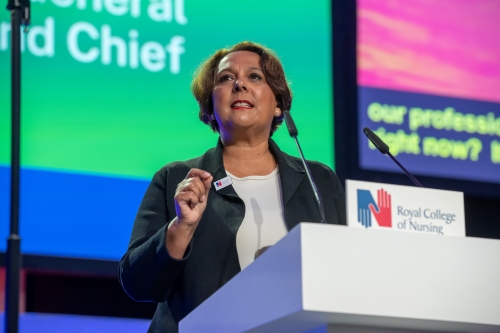Nurses facing six-month pay delay, warns new RCN chief

The party that wins the general election must spend the summer finalising the 2024-25 NHS pay award to prevent further delays for nurses, the new leader of the Royal College of Nursing (RCN) has warned.
Professor Nicola Ranger, who has stepped up as acting general secretary and chief executive following the resignation of Professor Pat Cullen last week, addressed the topic of pay during her keynote speech today at RCN Congress 2024.
“The real risk is that patients will lose faith in the treatment they receive”
Nicola Ranger
She warned that, under current timelines, the pay award will be arriving at least six months late. It is supposed to be implemented at the start of the financial year, in April.
To limit the delays, Professor Ranger said the party that wins the general election on 4 July must get to work straight away on discussing and agreeing the pay award.
Waiting until parliament sits again in September could mean that nurses only start to see any uplift from November – six months too late, warned Professor Ranger.
Addressing delegates at RCN Congress today, Profess Ranger: “Whoever forms the next UK Government, they must realise that you are feeling undervalued and underappreciated.
“Ministers must negotiate through the summer to get a deal done quickly.
“NHS workers deserve a fair pay award. And it is not fair to keep them guessing.
“Whoever the prime minister and health secretary will be, we can meet and we will negotiate.”
She said the RCN would give its members a say on the pay award when it is announced.
“If you decide it is not good enough, you will decide what action we take,” added Professor Ranger, suggesting that further industrial action could be an option in future.
It comes after RCN members across England, Wales and Northern Ireland held various strikes over the 2023-24 pay deal.
Professor Ranger warned that long delays and a “disappointing” pay award for 2024-25 “would fail to move the debate on”.
Also during her keynote speech, Professor Ranger launched the RCN’s new UK general election manifesto, which outlines the college’s policy demands, top of which is related to pay.
The manifesto calls for a “fully funded, substantial, restorative pay rise for all nursing staff”, as well as automatic progression from band 5 to 6 for NHS after a certain period of time.
Other demands in the manifesto included:
- Introduce enforceable nurse-to-patient ratios in all health and care settings;
- Provide legal protection for people raising concerns about unsafe staffing;
- Fund mental health support for all nursing staff, provided by every employer;
- Eradicate corridor care, and force the reporting of it;
- Commit to government-funded nursing degrees in every UK country with a job guarantee for all graduates;
- Revoke legislation restricting the right to strike, namely the Strikes (Minimum Service Levels) Act 2023 and Trade Union Act 2016;
- Protect the title ‘nurse’ in law;
- End exploitation of internationally recruited health and social care workers;
- Provide sufficient funding for continuing professional development;
- End punitive immigration policies, for example those that prevent overseas care workers from bringing their families with them on their visas;
- Increase overseas aid spending to tackle global nursing shortages.
On the topic of corridor care, Professor Ranger repeated concerns raised by the RCN that this practice was being normalised.
Warning that patients were dying in corridors, she said the RCN was declaring a “national emergency” in health and care services.
“Nothing breaks my heart as much as when I speak to a nurse who thinks there is no way back from this,” she added.
“And the real risk is that patients will lose faith in the treatment they receive.”
She added: “Corridor care is unsafe, undignified and unacceptable. We are drawing a line under this together.
“I am, with your support, declaring a national emergency in our health and care services and I challenge all political parties to address this head on.”
Meanwhile, Professor Ranger also revealed that she had written to political party leaders calling for an urgent investigation into exploitation of nursing staff in the social care sector.
She said: “Our current care system has some unscrupulous employers, we need to urgently challenge them.
“Some people have shared with me their experience of paying thousands of pounds to agencies for jobs that don’t even exist.
“Nursing staff cannot be subjected to abuse or exploitation in the UK. You need to know you are welcome here.”
Professor Ranger admitted that taking the podium today – her first time ever speaking at an RCN Congress – after just a few days as acting general secretary and chief executive was a “little daunting”.
It was announced on Wednesday last week that Professor Cullen was stepping down with immediate effect in order to try and become an MP with Northern Irish party Sinn Féin in the upcoming general election.
Previously chief nursing officer and deputy general secretary and chief executive, Professor Ranger has stepped up into the top role on an interim basis.
Professor Ranger was met with a standing ovation when she finished her keynote today by declaring that “nursing needs a fresh start and a new place in health care”.
A nurse for 35 years, Professor Ranger has a background in intensive care nursing and for the last decade she has been a chief nurse in different NHS hospitals before moving to the RCN in December 2022.






